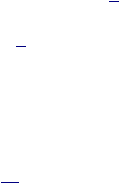
The same reasoning applies when converting between any units. For example,
converting pounds weight to kilograms. 1kg is equivalent to 2.2lb. Do you
divide the number of pounds by 2.2 . . . . . or do you multiply? You must
divide . . . you must get fewer kilograms because the kilogram is a larger
quantity than the pound.
Example 3
If £1 = 10 francs, how many francs do you get for £20.50?
£1
=
10 francs
£20.50
=
10 × 20.50
=
205 francs
Example 4
Change 48 deutschmarks into £s sterling, given that 4 deutschmarks = £1
4 deutschmarks
=
£1
1 deutschmark
=
£1 ÷ 4 = £
1
4
48 deutschmarks
=
£
1
4
× 48
=
£12
Alternatively, the pound is worth more so that you get fewer pounds. Therefore
divide by 4.
48 deutschmarks
=
48
4
= £12
Exercise 3
Use the following fixed exchange rates:
£1 = 10 francs (French)
£1 = 200 pesetas (Spanish)
£1 = 4 deutschmarks (German)
£1 = 2000 lire (Italian)
1)
Change £200 into francs.
2)
A man bought a present for 600 francs. How many £s was this?
3)
A woman bought 750 DM. How many £s did this cost?
4)
Change £200 into Italian lire.
5)
If a girl went to Spain with £150, how many pesetas would you have?
6)
If the same girl came back from Spain with 1000 pesetas, how much did she
spend (in £s) while in Spain?